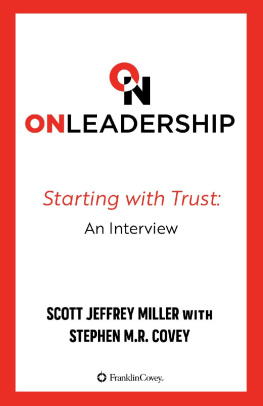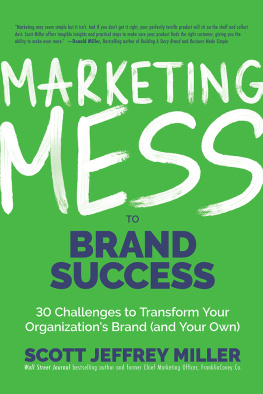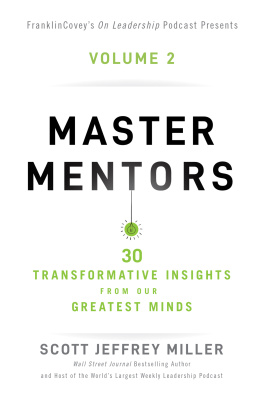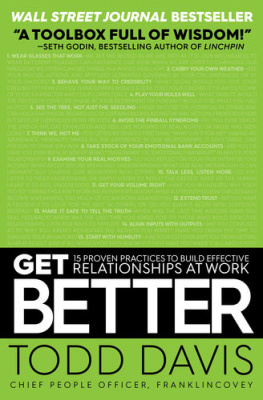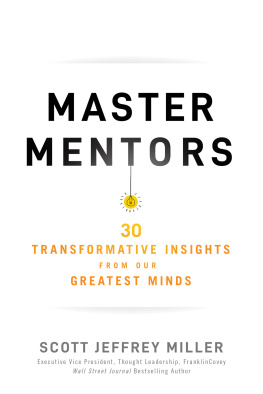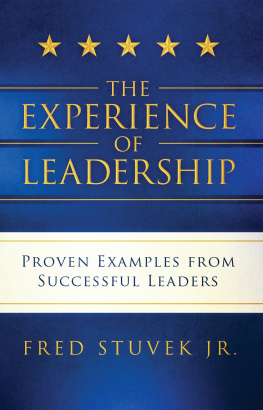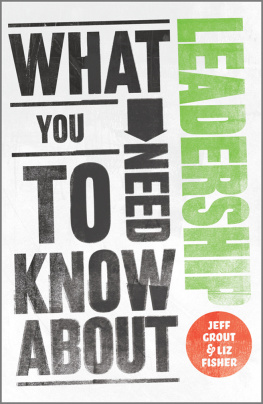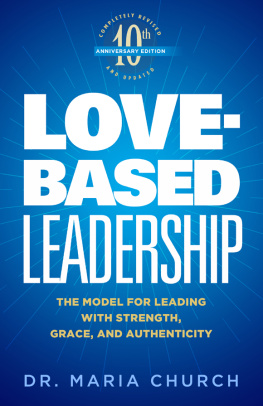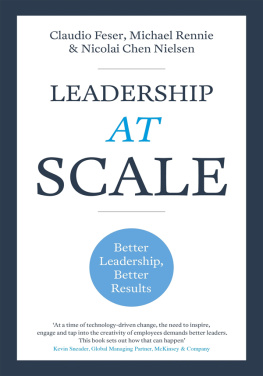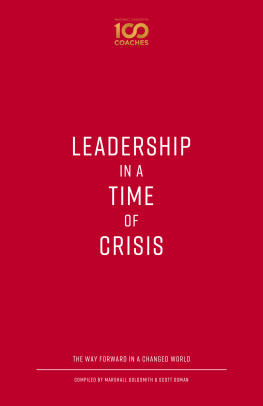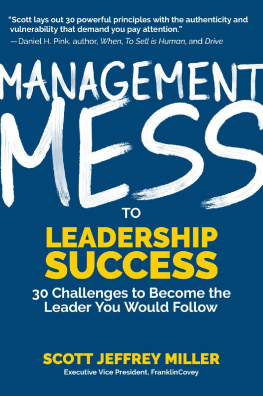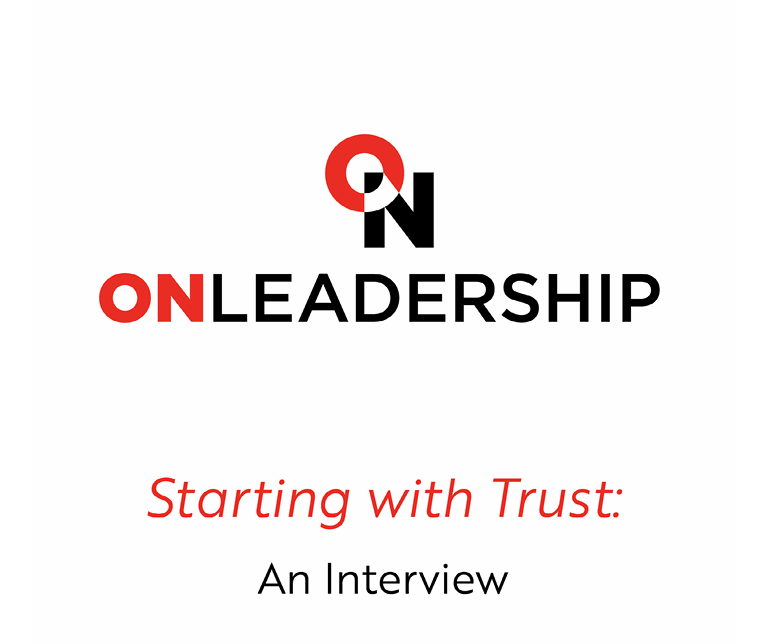
Copyright 2019 FranklinCovey Co.
Published by Mango Publishing Group, a division of Mango Media Inc.
Mango is an active supporter of authors rights to free speech and artistic expression in their books. The purpose of copyright is to encourage authors to produce exceptional works that enrich our culture and our open society.
Uploading or distributing photos, scans or any content from this book without prior permission is theft of the authors intellectual property. Please honor the authors work as you would your own. Thank you in advance for respecting our authors rights.
For permission requests, please contact:
FranklinCovey
2200 West Parkway Blvd.
Salt Lake City, UT 84119 USA
For special orders, quantity sales, course adoptions and corporate sales, please email the publisher at or +1.800.509.4887.
On Leadership: Starting with Trust, An Interview: Interview with Stephen M. R. Covey on Starting with Trust
ww.franklincovey.com
ISBN: (ebook) 978-1-64250-084-4
Printed in the United States of America
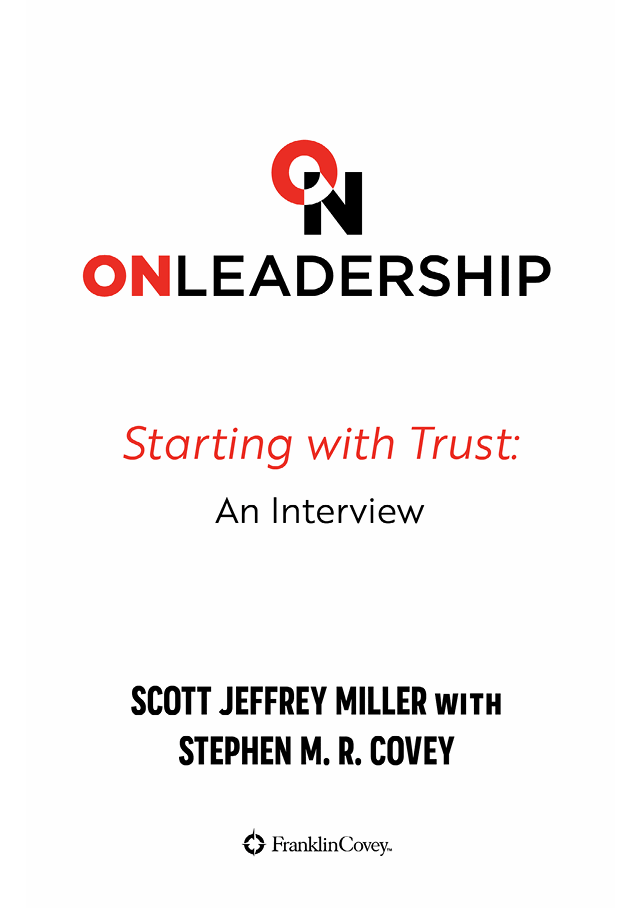
On Leadership is an ongoing interview series between Scott Miller, FranklinCoveys Executive Vice President of Thought Leadership, and various leadership experts and industry icons. Scott edits these conversations for clarity and continuity .
Starting with Trust
Its not easy sharing your name with the world-renowned author of The 7 Habits of Highly Effective People . But that didnt stop Stephen M. R. Covey, son of the late Dr. Stephen R. Covey , from becoming an acclaimed writer and thought leader in his own right. Today, Stephen M. R. is the co-founder and Global Practice Leader of FranklinCoveys Speed of Trust Practice, and a global trust expert. With both a leadership focus and a robust hairline that differentiates him from his famous father, Stephen M. R. appeared as the first guest on the On Leadership series. The studio set contains facing chairs, a not-too fashionable throw rug, and walls adorned with the most influential books read by his interviewer (and for this work, his editor).
One book prominently displayed is The Speed of Trust by Stephen M. R. Covey. Originally written in 2006 with an updated edition published in 2018, The Speed of Trust is the best-selling guide for leaders, teams, and organizations looking to build high-trust cultures and relationships. Today, as trust between people, organizations and governments is at an all-time low, Stephen M. R.s work is even more important. For him, trust wasnt a focus that came from long musings in an academic ivory tower (although Stephen M. R. graduated from Harvard Business School so he has the elevator code to the top floor); rather, his insights on trust came through years working as a practitioner, leader, and executive. He felt the pull to share what hed learned with others: Having done the business side, I felt compelled to write and to speak and to do some of the things that my father was doing. I hadnt done it prior because, at the time, I felt I had nothing to say, but then I found something I wanted to talk about. That was trust. Trust, it would turn out, was the one thing that changed everything. For Stephen M. R., trust is the key leadership competency in todays global economy.
Today, as trust between people, organizations, and governments is at an all-time low, Stephen M. R.s work is even more important. Trust is the key leadership competency in todays global economy.
A Practitioners Perspective
After graduating from business school, Stephen
M. R. started at the bottom at the Covey Leadership Center as a client developer. He learned the business and the needs of various clients. He was promoted to client manager and then as the leader over the client services group. Eventually, Stephen M. R. was asked to serve as the president and CEO. He built a great organization and brand, merging with Franklin Quest to form FranklinCovey. With trust, Stephen M. R. understood that most in the business world merely viewed it as a soft, social virtue. And the literature at the time looked at the topic in simplistic or overly academic ways. But his experience told him something different: Trust was practical, tangible, and actionable. He believed he could make a business case that treated trust as something both economic and learnable.
Trust is practical, tangible, and actionablesomething both economic and learnable.
The Speed of Trust
Stephen M. R. put his expertise to paper when he authored The Speed of Trust. Now, when a book sells over two million copies and is translated into twenty-two languages, its at the top of the top in the business market. And thats what The Speed of Trust has done. Stephen M. R. believes the books success has to do with its global applicability across cultures and organizations, and that the need for trust is greater than ever. Abuses and violations of trust at every level in society fill the news cycles. Bureaucracy, redundancy, fraud, and waste are often the results.
The Speed of Trust is the antidote to a low-trust world: it outlines how leaders and organizations can operate with high trust while understanding why it matters. But its difficult. Stephen M. R. describes the process like swimming upstream: You might work to be a high-trust player in a low-trust industry or take on the role of a trusted leader in a company thats not known for trust. It takes work to learn to operate with high trust. Even after the effort yields positive results, the job of building trust continues as models become mentors. If it sounds complex, dont worry: Stephen M. R. wrote The Speed of Trust to teach anyone how to do it.
Paradox: Crisis of Trust vs.
Renaissance of Trust
Theres a lot of P words at FranklinCovey, like principles and paradigms. But with The Speed of Trust we get to discuss another: paradox. In the midst of the worlds crisis of trust, theres a concurrent renaissance of trust. You can see it in small pockets, spearheaded by innovative leaders dotting the globe. Stephen M. R.s extensive travel allows him to engage these pockets of trust firsthand while keeping an eye on the larger global trends. The trust renaissance also shows up in high-trust organizations looking to strengthen their cultures and produce even better results. So, despite the worlds worsening trust crises, Stephen M. R. knows a growing number of leaders are abandoning the old notions of trust as a soft virtue and recognizing that its fruits reach all the way to the bottom line. So long as trust can be used as a hard, financial measure, innovative leaders will continue to work with Stephen M. R. to fuel its resurgence.
The Speed of Trust is the antidote to a low-trust world: it outlines how leaders and organizations can operate with high trust while understanding why it matters.
Leadership and Trust
So where does trust come from? Stephen M. R. teaches that it flows from two sources: ones credibility and ones behavior. Credibility is defined as who you are and what you can do; behavior is defined as how you do what you do. Stephen M. R. argues that the first job of a leader is to build ones credibility and enact the behaviors that inspire trust. The second job of a leader is to extend trust. It is the combination of inspiring and extending trust that defines leadership.
Sometimes leaders conflate the notion that acting ethically means one is also building trust. But because trust results from the interplay of both character and competence, its possible for a leader to show ethical behavior and not inspire trust. For example, a person might be honest (a character trait) but unable to deliver (a factor of competence). The reverse is also true: A person can have high competence (they know how to deliver) but have low character (running everyone over, being unethical, or cutting corners).
Next page
